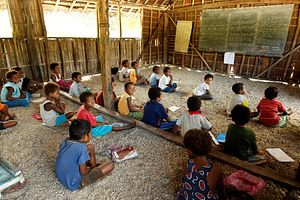It passed quietly in Australia but Papua New Guinea celebrated 40 years of independence from Australian colonial rule on September 16.
Papua New Guinea was one of the last colonies in the world and gained independence under Australian Prime Minister Gough Whitlam, who said: “By an extraordinary twist of history, Australia, herself once a colony, became one of the world’s last colonial powers. By this legislation, we not only divest ourselves of the last significant colony in the world but we divest ourselves of our own colonial heritage. In making our own former colony independent, we as Australians enhance our own independence. Australia was never truly free until Papua New Guinea became truly free.”
Few Australians seem to know, or remember, that Australia once administered PNG and used a force of kiaps, a patrol officer in charge of a region whose role could encompass police officer, judge and sometimes jailer, to keep order across the remote nation. That seventy years has been quickly forgotten even though Australia’s history and sense of self is inextricably bound up with the wartime heroism of the Kokoda Trail and the local Papua stretcher bearers who provided terrific assistance. In fact, there is even a replica Kokoda Trail in the hills outside Melbourne, popular with hikers and Japanese tourists. After that it might be Bougainville or Ok Tedi that Australians remember.
Writing in The Conversation, Nicholas Ferns makes exactly that point, “When Australia’s ‘colonial’ history is mentioned, it almost always refers to the period 1788-1901. Little attention is given to Australia’s 20th-century empire of Papua New Guinea and Nauru.”
Though recipient of the largest chunk of Australian aid, even after deep cuts to the aid budget, and part of the government’s Pacific Solution for refugees, Papua New Guinea doesn’t figure heavily in the Australian consciousness compared with more distant neighbors like Indonesia, East Timor or even China. Whilst it has one of the fastest-growing economies anywhere (despite a recent slowdown) opportunities for business or Australian exports remain far lower than they do in Asia.
What news does make it to Australia, or the rest of the world? The recent Pacific Islands Forum held in Port Moresby, but partly for the heavy criticism Australia and New Zealand were subject to over climate change. Witch burnings, which we have covered also.
It seems there has often been a climate of friendship, but rarely of full understanding, as this excellent 1999 feature story by journalist Sean Dorney explains. Dorney, who had been in PNG since 1974, writes early in his piece, “I began my talk that night with a tragic tale to illustrate how we Australians and our neighbours often don’t understand each other very well and how easy it is for signals passing between us to be misinterpreted.” The rest is far too long to even give a useful précis, but one point he does make is that many senior political figures told him that, “their country suffers from too pure a form of democracy.”
It is sixteen years since that story has been written and the former revolving door of PNG prime ministers has settled down somewhat, with Peter O’Neil holding the job since 2011. In fact, a recent Lowy piece (also by Sean Dorney) even asked if Australia should look to PNG for a lesson in governmental stability.
Political stability and good governance have not necessarily been out of the country’s reach, but matters have been complicated by many factors, from the remoteness of so many communities to the tremendous diversity of languages – well over 800 – and “wantoks” or traditional owners of land who can wield money and power in some areas. Some experts also suggest the resources boom and the migration to bigger towns or cities has also been partly responsible for the upsurge of witch killings and their uncharacteristic sadism.
And as The Australian’s Rowan Callick pointed out in a September 16 feature, “Forty years after independence, PNG languishes at 157th on the UN’s Human Development Index, with Australia second and Tanzania 159th.” Julius Nyerere’s Tanzania was the model at independence.
And this is probably the vague impression Australians do have about their near-forgotten former colony: poverty. The diversity of culture, growing educated urbanites, or even avid social media scene are less known, sadly. With that we’ll leave you with this.

































